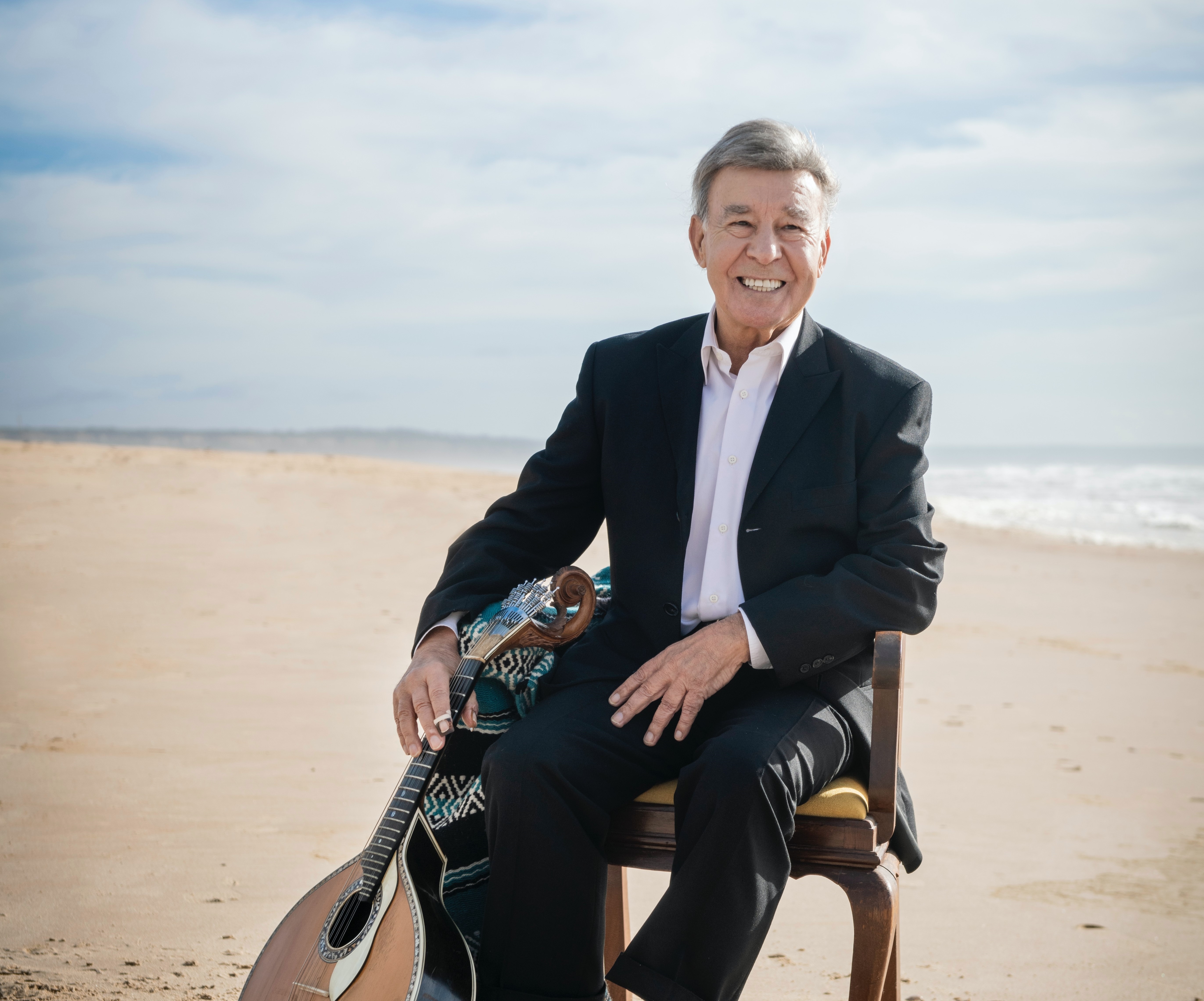Know more:
António Chaínho
(N. 27 January, 1938)António Dâmaso Chaínho, better known in the arts world as António Chaínho, was born in the Alentejo, at the village of São Francisco da Serra (Santiago do Cacém) on the 27 January 1938.
Influenced by his parents he already played the Portuguese guitar at 8.
The Chaínho family owned the "Tasca do Faúlha", a venue for fado lovers where his mother used to sing while his father played the guitar. Young António began to play the Portuguese guitar at 13, trying to accompany his mother, until her death made him interrupt his performances at 16. He only resumed playing two years later.
At that time another young man from the Alentejo also began visiting the "Tasca do Faúlha", attracted by the guitar playing of the “Chaínhos” (father and son). His name was António Parreira, today an illustrious Portuguese guitar player, who began playing Spanish guitar precisely to accompany António Chaínho. They formed a duo that performed in innumerable shows for three years.
A self-taught musician, Chaínho felt motivated to improve and become a professional by the radio programmes of José Nunes, Raul Nery and Jaime Santos, which he listened to at Emissora Nacional broadcasts.
Later on, during his military service, he received many requests to perform in private parties. Upon his arrival at Mozambique, where he was deployed, he strongly developed his artistic career and became a professional in 1961.
After returning to Portugal (1966) he devoted himself fully to his career as musician. He established himself in Lisbon, performing in several Fado houses, while simultaneously joining the guitar group led by Jorge Fontes. He was invited to replace Portuguese guitar player Carlos Gonçalves, who had left, and eventually joined the cast of Fado house "A Severa".
From then on António Chaínho developed an intense activity accompanying great artists like Amália Rodrigues, Alfredo Marceneiro, Hermínia Silva, Lucília do Carmo, Carlos do Carmo, among others.
Later on, at the invitation of José Maria Nóbrega (his marriage godfather), together with António Luís Gomes, he joined the permanent cast of "Restaurante Folclore" and toured all over Portugal and travelled abroad, namely to Brazil.
In 1971 he formed a guitar group with José Luís Nobre Costa (Portuguese guitar), Raul Silva and José Maria Nóbrega (Spanish guitars).
In 1974 he created a company with fado singer Rodrigo and Raul Silva for establishing a amateur Fado house in Cascais, called "D. Rodrigo", which would later change its name to "O Picadeiro".
At a certain point in time he joined the cast of "O Faia" and, together with José Maria Nóbrega, he later became the exclusive accompanying musician of Fado singer Carlos do Carmo, travelling with him to Europe, Brazil and the USA.
He recorded and played in the radio and television with virtually all major Fado singers in Portugal. In Spain he recorded with Maria Dolores Pradera, José Luís Alto and Carlos Cano.
In time António Chaínho gradually felt the need to do more than simply accompanying and began to invent “other things”, in addition to what he already knew. He made his debut as composer and recorded, in the 1970’s, his first EP, called "Solos de Chaínho".
Meanwhile he joined singers like Fafá de Belém and Gal Costa in their experiences and incursions into Fado.
He created a new sound with Rão Kyão, shown in albums like "Fado Bailado", recorded in the 1980’s, "Estrada da Luz" and "Oásis". The two musicians toured together (1990-1991) and visited Japan for the first time.
From 1992 onwards he launched a solo career and was invited to participate in major international events, side by side with the most famous soloists in the world, such as Paco de Lucia and John Williams, and in festivals such as the Córdova Festival.
In 1996 he recorded a CD with the London Symphonic Orchestra, directed by José Calvário.
Since then he has participated in prestige events, performing for celebrities such as Hillary Clinton. Special reference should be made to the Memphis Festival in May (USA) and the show at the Bockenheimer Depôt, in the framework of the programme of the 1997 International Fair of Frankfurt.
During Expo'98 he participated in the Tribute to Amália Rodrigues at Praça Sony. He was a special guest of Fafá de Belém and presented a solo concert with one of the largest audiences of the programme "Portuguese Guitar Festival". In Expo'98, he also participated in the show Red, Hot + Lisbon and in the recording of a CD with the same name. This record, in addition to Portuguese-speaking artists, includes other names like K.D.Lang.
A key aspect in his career is the presence, at his shows, of guests as special as Teresa Salgueiro (Madredeus) and Filipa Pais.
In late 1998 he recorded CD "Guitarra e Outras Mulheres", inventing a new musical genre in which the Portuguese guitar clearly expresses its importance for world music. This project was born from the participation of António Chaínho in the recording of the Fado Hilário theme by Canadian singer K.D. Lang. During the recording sessions, Chaínho met producer Andrés Levin, whose work included previous collaborations with David Byrne, Arto Lindsay and Marisa Monte, among other pop and vanguard references. After listening to the last track, with additional instruments and arrangements by Greg Cohen (who has worked with Tom Waits, Laurie Andreson and the Rolling Stones), both the master of Portuguese guitar and the producer realised the new potential of Portuguese guitar that could be tapped into, in the context of both contemporary and traditional music.
As suggested by the title, "A Guitarra e Outras Mulheres" involves several female voices who complement the compositions of António Chaínho. This is Teresa Salgueiro’s first recording without Madredeus, lending her voice to two themes. Other exception participations are also those of Filipa Pais, Marta Dias and the debut of Ana Sofia Varela, a gifted young singer with a remarkably strong voice. Brazilian singers Elba Ramalho and Nina Miranda (vocals of Smoke City) make a magnificently subtle link between Fado and Bossa Nova.
In 1998 he was awarded the Light Music Prize of Casa da Imprensa, who considered him "one of our best Portuguese guitar players".
In the end of 1999 he travelled again to Brazil. As a result of this journey, in 2000 he recorded the “Lisboa-Rio” album in close collaboration with Celso Fonseca and Jacques Morelenbaum. He made a careful repertoire selection of Brazilian music originals and classic songs, in a perfect fusion with the masterful execution of Portuguese guitar.
Proving the success of his performances abroad, Chaínho was invited to accompany many artists including José Carreras, Adriana Calcanhoto, Maria Betânia and more recently the Portuguese Blasted Mechanism, introducing new trends and musical combinations that stress the richness of Portuguese guitar.
In spite of this magnificent pathway, Chaínho feels that the Portuguese guitar is not sufficiently known and fears that its preservation in the future has not been secured. He therefore joined in 2001 the faculty of the Museu do Fado School, developing a teaching activity aimed at preserving, safeguarding and disseminating his instrument.
In collaboration with Fundação do Oriente, António Chaínho has taught at seminars and workshops in Sri Lanka, New Delhi and Bangalore, among other Asian cities, with a view to disseminating the Portuguese guitar. It is therefore only natural that from time to time he receives pupils from the East to perfect their technique. In 2005 he opened a School of Portuguese Guitar at Santiago do Cacém and his teaching of Portuguese guitar now includes Japanese pupils.
In 2005 António Chaínho revisited 40 years of his career at Casa da Música, in Porto — only one show with special guests and a selected repertoire.
Born in Santiago do Cacém, his hometown awarded him its Medal of Honour in 2005.
Other discography:
"LisGoa" (2009)
"Entre amigos" (2012)
"Cumplicidades - 50 anos de carreira" (2015)
Source:
Caldeira Cabral, Pedro (1999), "A Guitarra Portuguesa", Col. "Um Século de Fado", Lisboa, Ediclube;
Museu do Fado – Interviewed on the 16 August 2006;
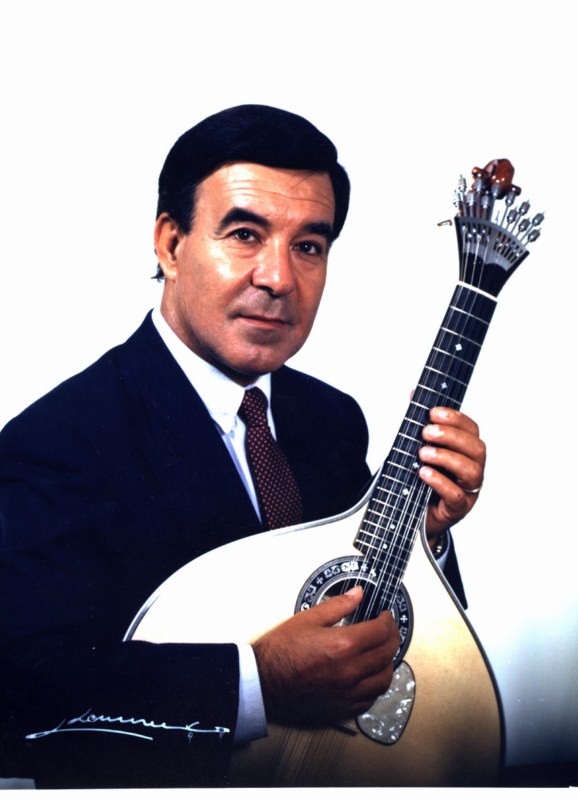
António Chaínho, s/d.
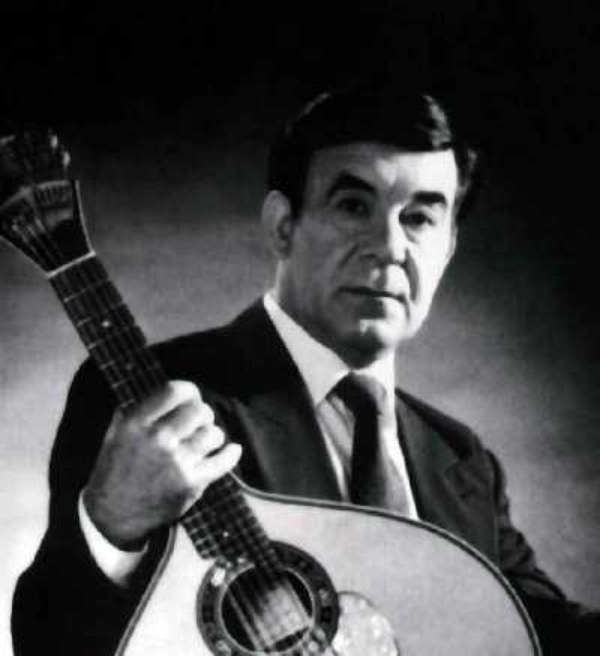
António Chaínho, s/d.
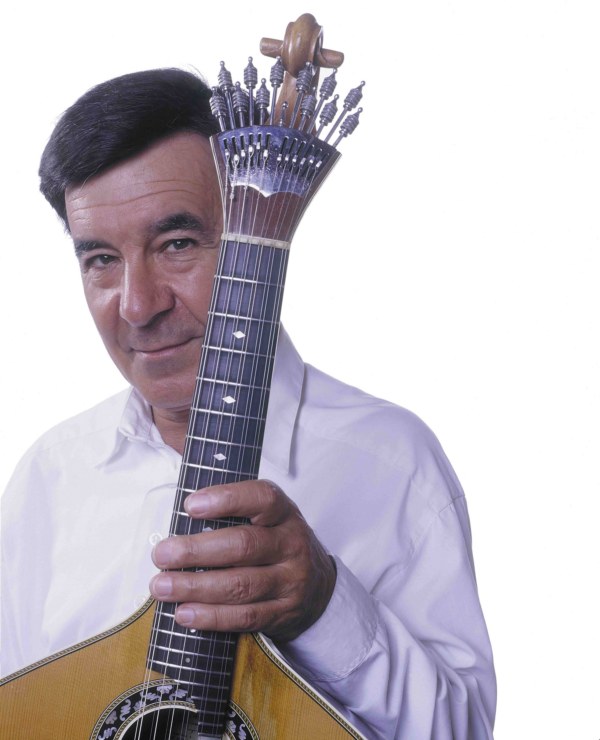
António Chaínho, s/d.
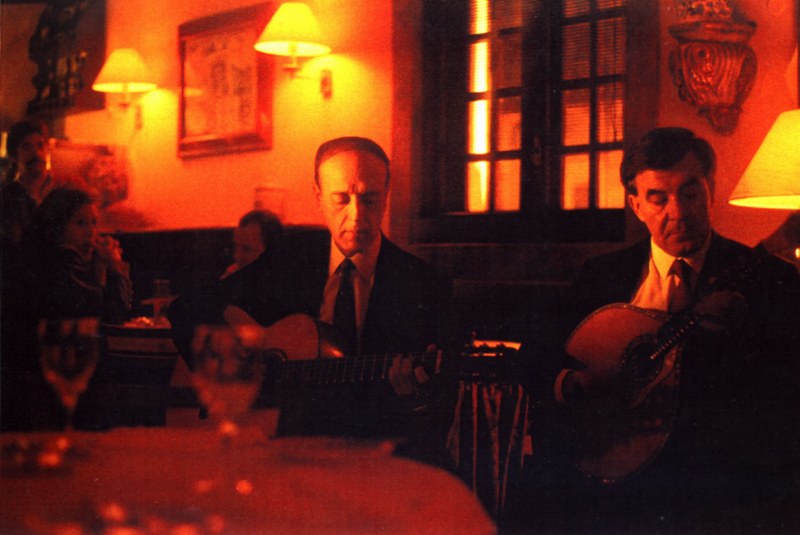
António Chaínho e Fernando Alvim, 1996
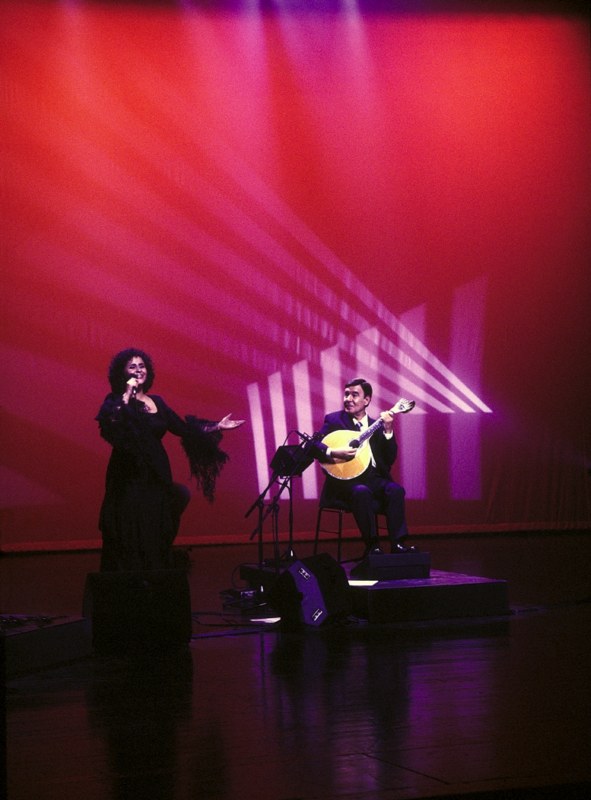
Marta Dias e António Chaínho, s/d.
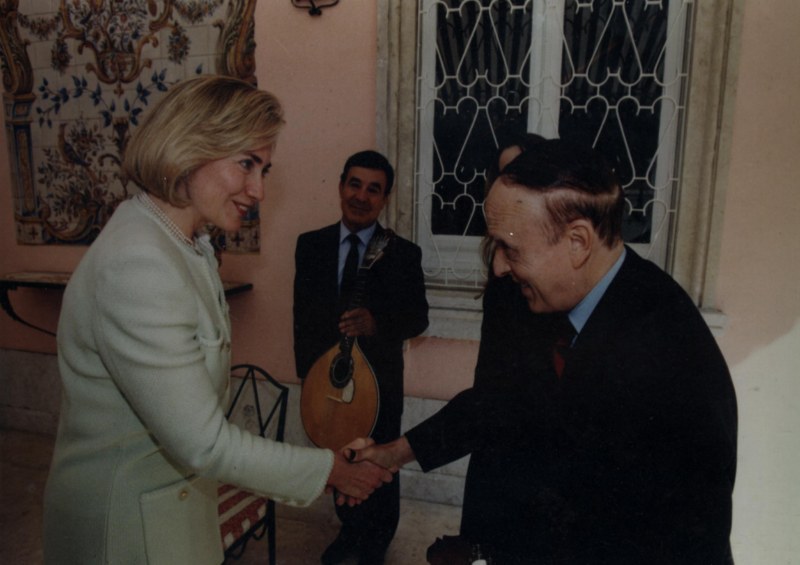
António Chaínho e Fernando Alvim recebidos por Hillary Clinton, s/d.
-
Rotas Marítimas António Chainho (António Chainho)
